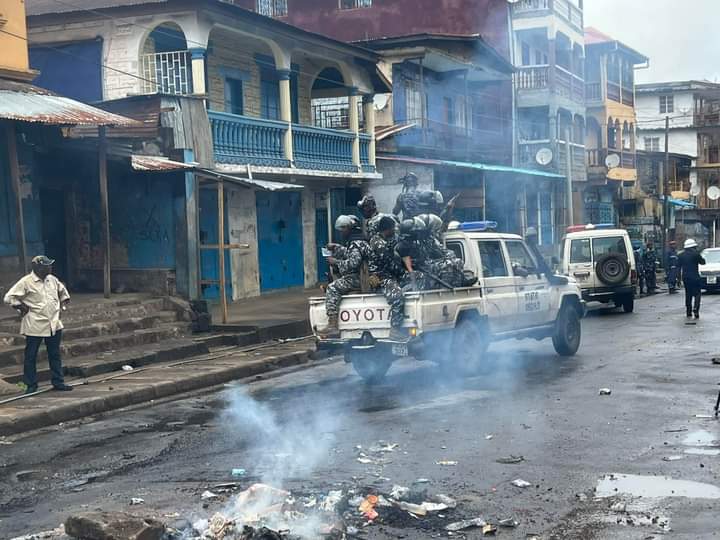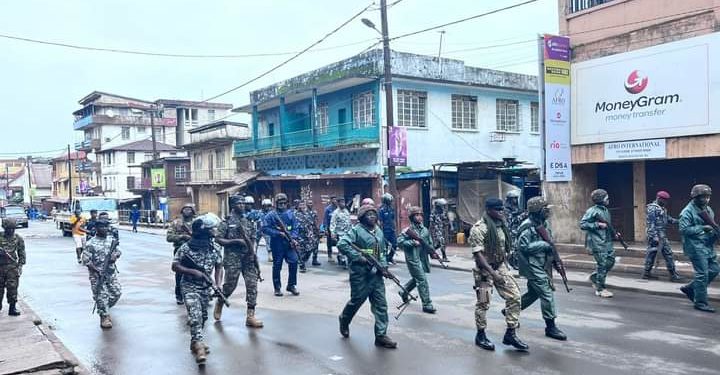An indefinite curfew has been declared in Sierra Leone, after a day of violent protest that turned bloody.
Several people have been reported dead, including at least one police officer. There has been no official confirmation of the number of fatalities.
The incident on Wednesday was part of a protest called by what the Sierra Leone Police say are unknown people who claimed they wanted to demonstrate against economic hardship in the country.
Citing social media postings, the police say those behind the protest intended it to last for three days, starting Monday, August 8th. Although Monday’s protest wasn’t heeded by the public, the city was largely deserted, as most businesses shutdown.
On Wednesday, however, a handful of protesters took to the streets.
Footages shared on social media showed some of them displaying placards and chanting “we wan eat”, which means ‘we are hungry.”
It is not clear how the violence started, but individual accounts say the protesters got violent after the police dispersed them with warning shots.
Later, images of running battle between the police and protesters began surfacing on social media platforms.
The image of the lifeless body of a slain police officer was also shared, as well as what appears like a dead body of a civilian been carried by youths.
Wednesday’s protest prevented the country’s parliament from holding a scheduled proceeding.
Deputy Speaker of Parliament, Sengepoh Solomon Thomas, told lawmakers that they couldn’t proceed because of lack of “two third majority” as provided for in the constitution as well as the standing orders of the House. He also noted that they’d received “several distress calls” from some MPs reporting that they’d come under attack by protesters.
President Julius Maada has been out of the country since late July, on what State House described as a private visit to the United Kingdom.

On Wednesday, an image of the president disembarking from an aircraft emerged on social media, amid rumor that he’d returned to the country. This hasn’t been confirmed by the government.
But earlier in the day, Vice President Dr Mohamed Juldeh Jalloh addressed the nation, during which he declared the curfew.
“For the last several weeks, some self-serving Sierra Leoneans have intensified the call for violence and the forceful overthrow of the legitimate government of President Julius Maada Bio. Government has shown restraint in an effort to uphold the fundamental rights of citizens,” Vice President Jalloh said in a televised statement aired on state broadcaster SLBC.
He added that the “unscrupulous” people went ahead with an unauthorized protest which led to loss of lives of innocent Sierra Leoneans, including security personnel.
The Vice President also spoke about the reported destruction of public buildings, including police stations.
“As a country of law and order, these violations are unacceptable in all their forms,” he stressed.
The VP’s statement, however, didn’t make it clear how long the curfew will last, a question many Sierra Leoneans have been asking. But a separate statement from the Inspector General of Police suggested that it could last beyond Wednesday.
According to the Vice President, the curfew runs from 3pm to 7am on Wednesday. The police chief went further to say that it runs from 7pm to 7am all other days.
Most of the skirmishes on Wednesday occurred in the east end of Freetown. Nonetheless, the effect was felt right across the city. Businessman Idrissa Sowa, who sells building materials in Wilberforce in the west end of the city, told ManoReporters that they’d been forced to close their shops, which affected their livelihoods. He urged the government to engage in dialogue with the protesters to calm the situation down.
Outside Freetown, there were reports of violence in some cities and towns in the northern region of the country, notably in Makeni, Magburaka and Kamakwe.
There have been calls for calm, both locally and internationally.
The ECOWAS Commission in a statement said it “strongly condemns” the violence and called for the perpetrators to be identified and brought to justice in accordance with law.
The United States Ambassador in a tweet also called for “calm and restraint on all sides,” as did the United Nations Resident Coordinator, who expressed “serious concerns” and offered to facilitate a dialogue process.
Diplomatic representatives of the UK and EU also weighed in on the matter.
Some Sierra Leoneans blamed the violence on the way the government, particularly the police, handled the threats.
The civil society group, Campaign for Human Rights and Development International (CHRDI), said the authorities could have avoided loss of lives had appropriate actions been taken. It called on the government to investigate what happened and hold everyone with accountable for their actions.
But it appears that the police had foreseen this event. And, according to a leaked letter seen by ManoReporters, it also requested for support under the Military Aid to Civil Power (MACP) policy, which is usually invoked in anticipation of extreme situations that threatens national security.
The letter from the head of the Office of National Security (ONS), dated 9th August and addressed to the Chief of Defence Staff of the Republic of Sierra Leone Armed Forces (RSLAF), requested the deployment of the military between 9th and 12th August.
It notes that the directive was from the Vice President’s office.
“The directive is consequent on the potentially volatile security situation in the country caused by repeated social media incitements of the gullible population to embark on a countrywide violent demonstration with the aim of subverting the peace and stability of the state,” it reads in part.
“The SLP has assessed its resources and advised that it may not alone cope with the emerging security situation,” it adds.






















